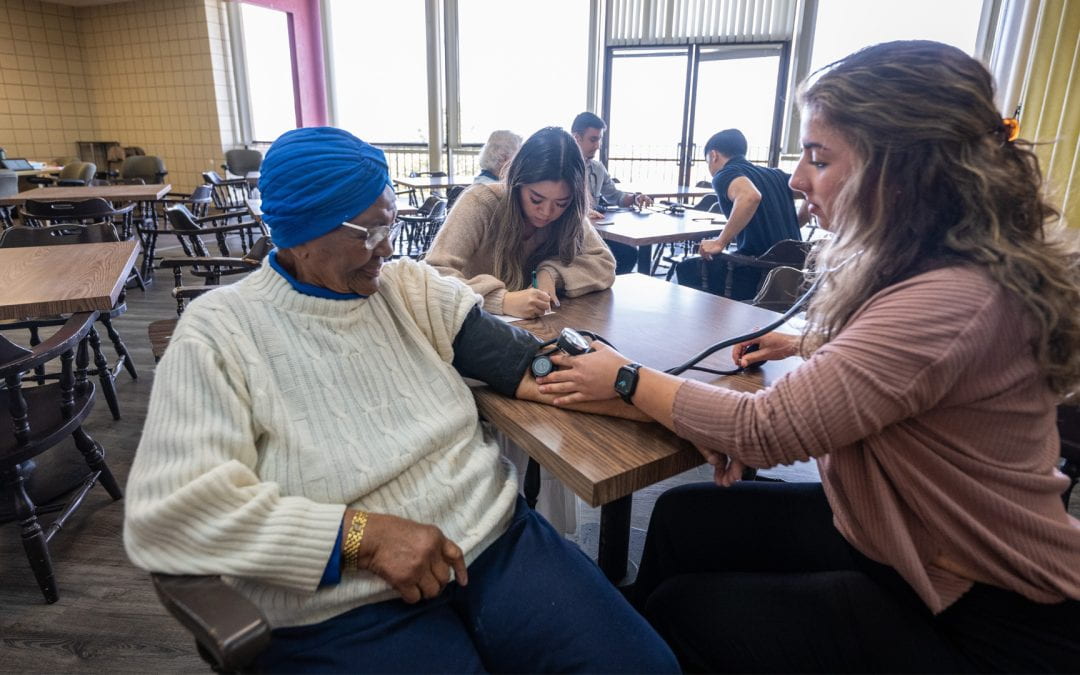NAACP Inducts Harry Edwards, Ken Noel, Tommie Smith and John Carlos into its Legacy Hall of Fame

Tommie Smith, left, Dr. Harry Edwards, Dr. Ken Noel, center, and John Carlos, right, returned to SJSU in October 2018 to recognize the 50th anniversary of Smith and Carlos’ iconic, black-gloved protest at the 1968 Games. Photo by Josie Lepe.
This weekend, the NAACP (National Association for the Advancement of Colored People) will induct four legendary Spartans into the NAACP California Hawaii State Conference Legacy Hall of Fame at a gala honoring their contributions to the Civil Rights movement: Dr. Harry Edwards, ’64 Sociology, ’16 Honorary Doctorate; Ken Noel, ’66 BA, ’68 MA Social Science; Tommie Smith, ’69 Social Science, ’05 Honorary Doctorate, and John Carlos, ’05 Honorary Doctorate.
The four honorees are synonymous with San José State’s tradition of social justice. Olympic medalists Smith and Carlos made history in 1968 when they raised their gloved fists on the podium during the medal ceremony at the Mexico City summer games — a statement of solidarity inspired by their work with the Olympic Project for Human Rights (OPHR), a movement established at SJSU in 1967 by Edwards and Noel.
The OPHR challenged the San José State’s athletic program and the United States Olympic Committee (USOC) to diversify their coaching and leadership ranks and asked a crucial question: Why should student-athletes and professional athletes compete for universities and organizations where they cannot also work? The OPHR was one of the first examples of athlete activism spurring international dialogue about human rights — a legacy forever memorialized at SJSU with the iconic Victory Salute statue depicting Smith and Carlos’ triumphant pose. But the conversation did not end there.
“This [NAACP] recognition is for all those athletes who have turned their athletic stages into platforms to advocate for that more perfect union,” says Edwards, professor emeritus of UC Berkeley and author of “The Revolt of the Black Athlete,” the seminal sports sociology text.
“This is for all of those athletes who have put their careers, their fortunes and even their lives on the line in pursuit of that more perfect union. It’s for the third wave of athlete activists that Smith and Carlos were a part of — Wilma Rudolph, Jim Brown, Bill Russell and Arthur Ashe. The Wyoming 14 football players, the Syracuse 8 football players, the WNBA. The award that I am being handed is theirs. They are the ones whose contributions are being recognized and honored. I am simply there to accept the award, to have been fortunate enough to be around to organize some of these efforts, to serve and chronicle them, to institutionalize them in the form of the sociology of sport, a field that I hope people will be studying and adding to and developing years after I am gone.
“They’re honoring the 157-year tradition of athlete activists standing up, putting everything on the line and saying not just to this country, but to the world: ‘We are better than this.’ Those are the auspices under which I will accept any award I get.”
The NAACP was founded in 1909, on the heels of a deadly race riot in Springfield, Illinois. Its mission is to ensure the political and educational equality of minority group citizens of the United States and eliminate race prejudice, and as such the organization works to remove barriers of racial discrimination through democratic processes.

Dr. Harry Edwards, center with microphone, addresses a crowd at SJSU during the Civil Rights Movement. Source: the Dr. Harry Edwards collection at Dr. Martin Luther King, Jr. Library’s Special Collections and Archives.
OPHR co-founder Ken Noel knows this history well. As a doctoral student at UC Berkeley, he worked closely with Chancellor’s Professor Troy Duster, senior fellow at the Chief Justice Earl Warren Institute on Law and Social Policy — and the grandson of Ida B. Wells, an NAACP founding member alongside W.E.B. DuBois and others.
“To get inducted into the Legacy Hall of Fame is an act of getting incorporated into a remarkable history of our struggle for freedom, justice and equal rights,” says Noel. “I can’t hold any honor more highly. If you add that this is the first time any institution other than San José State has recognized me, the appreciation is overflowing. Last year, Congresswoman Maxine Waters got inducted, so following in her footsteps is also a fantastic occurrence.”
The NAACP Legacy Hall of Fame honors outstanding community leaders who have fought tirelessly to advance the civil rights movement while also creating vital funding for local unit capacity-building, youth leadership programs and next-generation leadership programs and initiatives. Edwards, Noel, Smith and Carlos are being recognized as human rights activists who helped shape generations of civil rights advocates.
“The OPHR’s legacy is embodied in the fact of many notable athletes using their status to speak out and advocate for social change and human rights,” says Noel. “They also use their wealth to create programs for improving conditions in poor communities and environments worldwide. The OPHR sought to change the paradigm for what it means to be a great athlete for all time. We made it necessary for athletes to be more than one-dimensional beings relegated to sports. We expect athletes worldwide to use their public platform to advocate for civil rights. We do not see this movement subsiding or diminishing over the years ahead.”
In addition to their groundbreaking work as civil rights pioneers, Smith and Carlos set impressive records as members of the internationally-recognized Speed City Track and Field team led by Coach Bud Winter at SJSU. Charles Ryan, director of SJSU Track and Field programs, is thrilled to see them recognized by the NAACP.
“This is a phenomenal, long-time coming and well-deserved honor for these legendary men,” Ryan says. “I’m both humbled and honored to be leading the program whose reputation was built on their shoulders. I can only hope that in our current form we are making amends, and making them proud.”
Read more about Dr. Harry Edwards’ contributions to SJSU in Washington Square: The Magazine.




